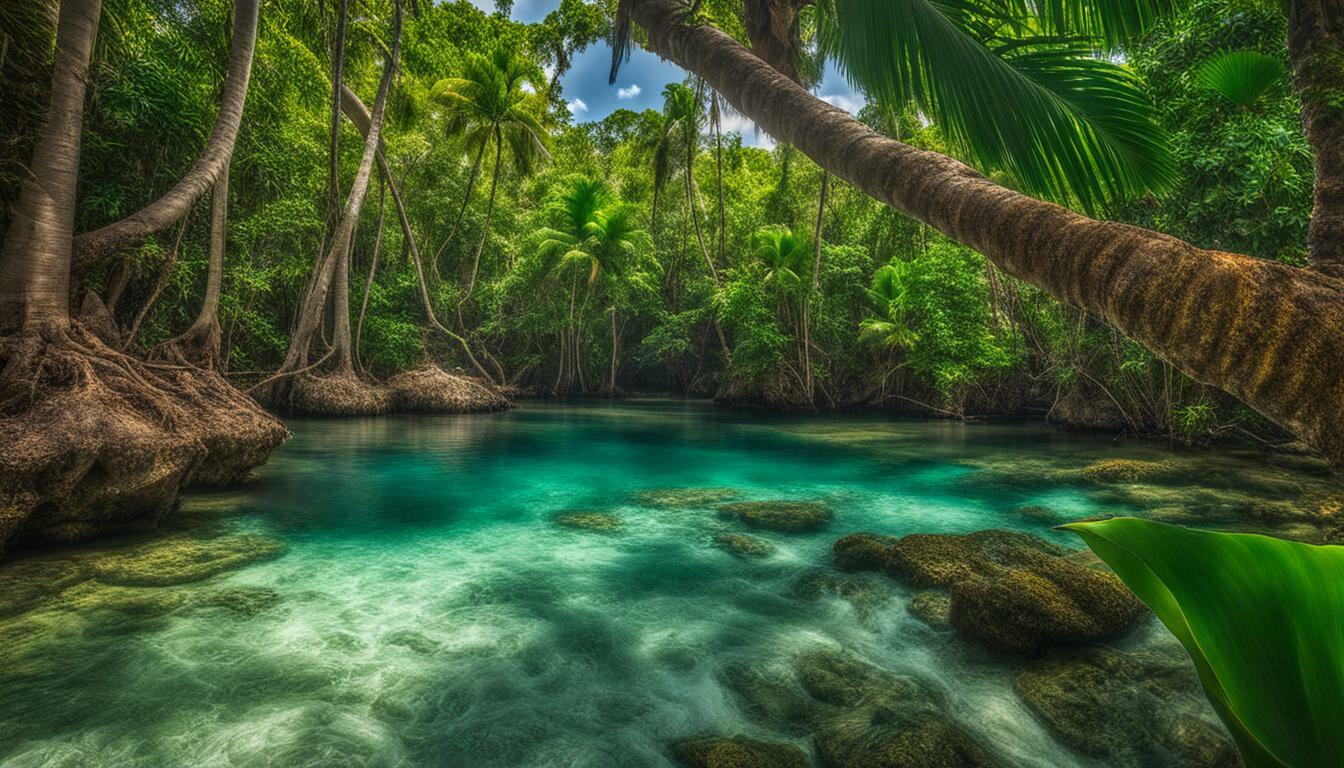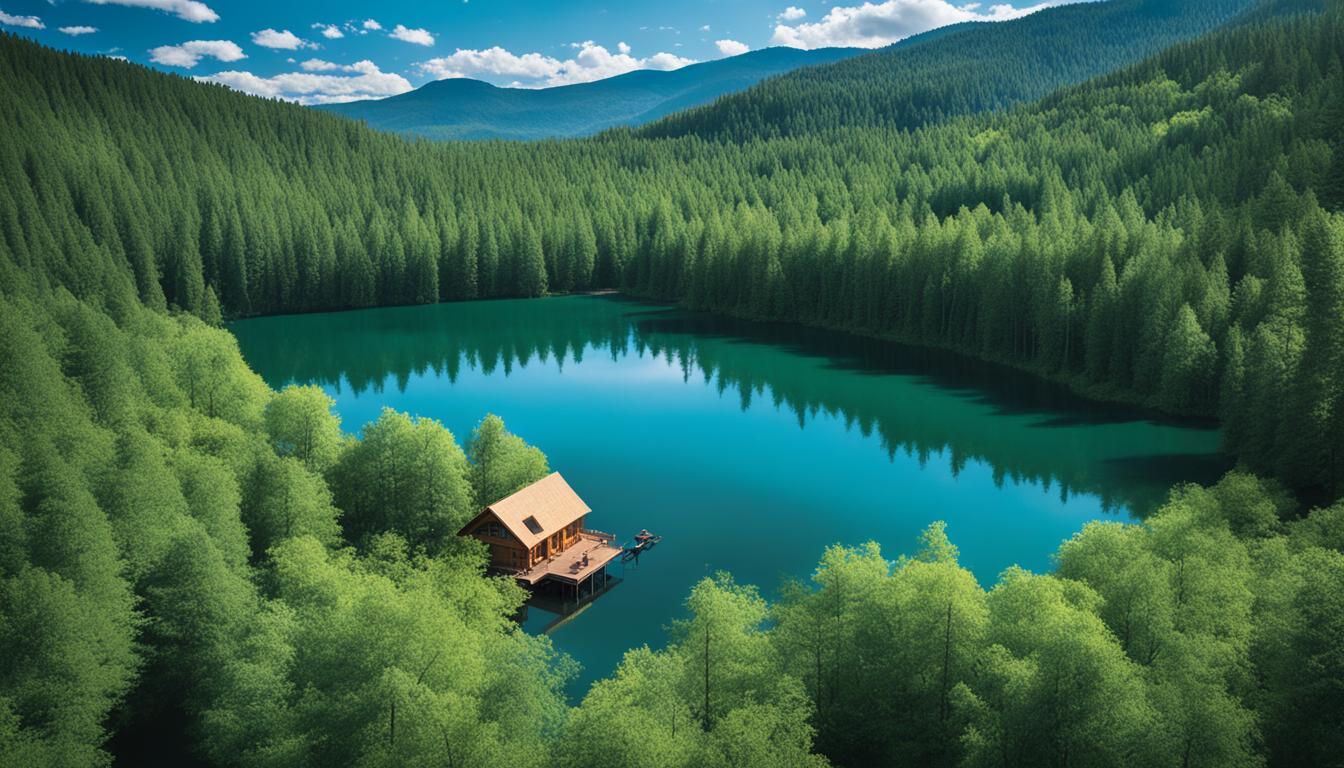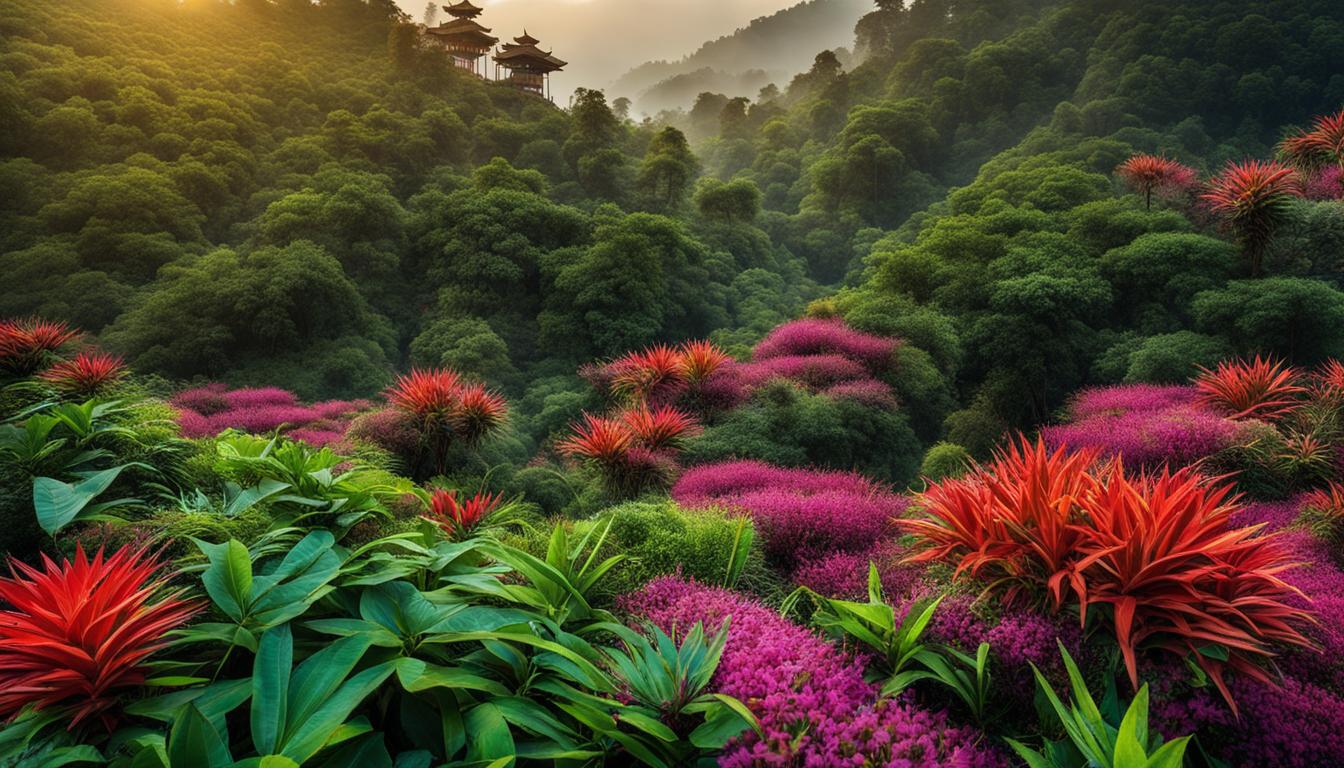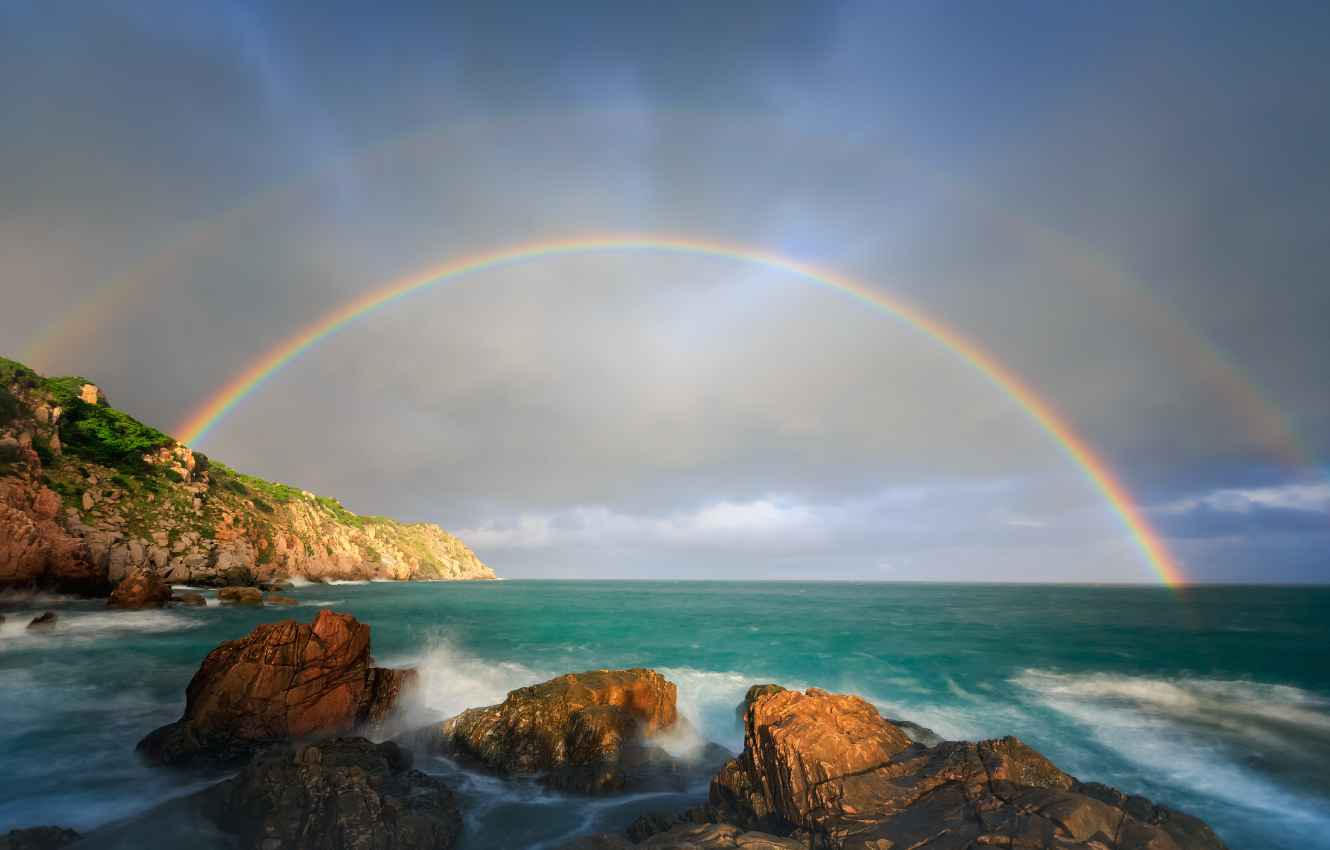Bahrain Biodiversity: Animal and Plant Species and What Is Under Threat
Bahrain, meaning ‘two seas’ in Arabic, is an archipelago off the coast of Saudi Arabia with a rich biodiversity that is under threat from various factors.
Key Takeaways:
- Bahrain is an archipelago off the coast of Saudi Arabia with a rich biodiversity.
- The nation’s biodiversity is under threat from climate change, rising sea levels, water scarcity, and other factors.
- Bahrain boasts unique animal and plant species, including the endangered Houbara bustard and the largest breeding colony of the Socotra Cormorant.
- The Bahraini government has implemented a National Biodiversity Strategy and Action Plan to conserve and restore the country’s biodiversity.
- Efforts are being made to protect endangered species in Bahrain and preserve the nation’s ecosystem services.
- Bahrain’s biodiversity is important for sustainable development and the well-being of future generations.
The Unique Animal and Plant Species of Bahrain
Bahrain boasts a diverse range of animal and plant species, thanks to its unique ecological conditions. Despite its small size, the archipelago has a rich biodiversity that is characterized by dry conditions in the region. The marine environment of Bahrain is home to oyster bed habitats, which produce pearls of international renown. These marine resources play a significant role in Bahrain’s economy, contributing to its Gross Domestic Product.
The bird population in Bahrain is also impressive, with more than 330 species recorded in the archipelago. Among them is the globally endangered Houbara bustard. Additionally, Bahrain is known for having one of the largest populations of dugongs, following Australia, Qatar, and the United Arab Emirates. The country also hosts the largest breeding colony of the Socotra Cormorant in the world. Furthermore, Bahrain has two wetlands protected under the Ramsar Convention and one UNESCO natural world heritage site, along with several marine protected areas.
To ensure the preservation of its biodiversity, the Bahraini government embarked on a two-year project in 2013 to document and conserve the country’s biodiversity. This initiative involved collaboration with major sectors of Bahraini society. The result was the development of the first National Biodiversity Strategy and Action Plan, focusing on improving livelihoods, protecting ecosystems, and ensuring food security. The strategy aims to restore marine resources and fish stocks, as well as protect agricultural lands from urban development.
The Importance of Bahrain’s Biodiversity
Bahrain’s biodiversity is of great importance, both locally and globally. The unique species found in Bahrain contribute to the country’s cultural heritage, economic development, and ecosystem services. The marine resources, such as oyster beds and coral reefs, support local livelihoods and contribute to the nation’s economy. Moreover, birdwatching and eco-tourism opportunities attract visitors from around the world to experience Bahrain’s diverse wildlife.
From an environmental perspective, Bahrain’s biodiversity plays a crucial role in maintaining ecological balance and providing ecosystem services. Wetlands, for instance, help regulate water flow, filter pollutants, and provide habitat for migratory species. Preserving biodiversity in Bahrain is essential for maintaining healthy ecosystems and ensuring the sustainability of natural resources.
| Unique Animal Species | Unique Plant Species |
|---|---|
| 1. Dugong | 1. Arabian Babool |
| 2. Socotra Cormorant | 2. Bahrain Wild Olive |
| 3. Houbara bustard | 3. Arabian Croton |
“Bahrain’s rich biodiversity is a testament to the country’s commitment to conservation. By implementing the National Biodiversity Strategy and Action Plan, Bahrain is taking significant steps towards protecting its unique animal and plant species for future generations.”
In conclusion, Bahrain’s biodiversity is a valuable asset that must be safeguarded. The country’s unique animal and plant species contribute to its cultural heritage, economy, and ecosystem services. By prioritizing conservation efforts and implementing the National Biodiversity Strategy and Action Plan, Bahrain is working towards minimizing the threats to its biodiversity and ensuring a sustainable future.

Threats to Bahrain’s Biodiversity
Bahrain’s biodiversity faces multiple threats, including the impacts of climate change, rising sea levels, and increasing water scarcity. These threats are putting immense pressures on the country’s wildlife and ecosystems. The unique marine environment of Bahrain, with its oyster bed habitats that produce internationally renowned pearls, is particularly vulnerable to the effects of climate change and ocean acidification.
The rise in global temperatures and sea levels poses significant risks to Bahrain’s coastal areas and marine life. Rising sea levels can lead to coastal erosion and the loss of critical habitats such as coral reefs and seagrass beds. The country’s marine resources, which contribute significantly to its Gross Domestic Product, are at risk of degradation and decline.
Furthermore, water scarcity is a growing concern in Bahrain, which relies heavily on groundwater for its water needs. The rapid urban expansion and increasing population demand for water have led to the depletion of aquifers and salinization of soil, negatively impacting both terrestrial and inland water environments. The agricultural sector, which utilizes traditional irrigation systems, further exacerbates the strain on water resources.
| Threats to Bahrain’s Biodiversity | Examples |
|---|---|
| Climate Change | Rising global temperatures, ocean acidification |
| Rising Sea Levels | Coastal erosion, loss of critical habitats |
| Water Scarcity | Depletion of aquifers, salinization of soil |
In response to these threats, the Bahraini government has implemented various conservation measures to protect and restore the country’s biodiversity. The National Biodiversity Strategy and Action Plan, developed in collaboration with different sectors of Bahraini society, aims to improve livelihoods, protect ecosystems, and ensure food security. The strategy includes initiatives to restore marine resources, protect agricultural lands from urban development, and promote sustainable fishing practices.
Additionally, Bahrain has established marine protected areas, wetlands protected under international conventions, and a biodiversity database known as the Clearing House Mechanism. These efforts highlight Bahrain’s commitment to biodiversity conservation and its recognition of the importance of preserving its unique natural heritage for future generations.
Overall, the threats to Bahrain’s biodiversity require concerted efforts from all stakeholders to mitigate the impacts of climate change, protect critical habitats, and promote sustainable development. By safeguarding its natural resources, Bahrain can ensure the long-term viability of its ecosystems and support the well-being of its people.
Conservation Efforts in Bahrain
The Bahraini government has implemented various conservation efforts to protect the nation’s biodiversity, including the development of a National Biodiversity Strategy and Action Plan. This comprehensive plan aims to improve livelihoods, protect the nation’s ecosystems, and ensure food security in a country with limited arable land. The strategy focuses on restoring marine resources and fish stocks to sustainable levels and protecting agricultural lands from urban development, which has been a growing concern in the rapidly developing nation.
One of the key achievements in Bahrain’s conservation efforts is the establishment of a Clearing House Mechanism for biodiversity, which serves as a biodiversity database. This mechanism is a requirement under the Convention on Biological Diversity, and Bahrain is the first country in the region to establish it. Through this process, the country has discovered 20 previously unknown species living in its territory, highlighting the importance of their conservation efforts.
To further support their conservation goals, Bahrain has also aligned its National Biodiversity Strategy and Action Plan with the Sustainable Development Goals (SDGs) and other biodiversity-related conventions, such as Ramsar on wetlands and the Convention on International Trade in Endangered Species of Wild Fauna and Flora. This alignment ensures that Bahrain’s efforts contribute to global development objectives and promote sustainable development.
| Conservation Efforts | Highlights |
|---|---|
| Development of National Biodiversity Strategy and Action Plan | Improve livelihoods, protect ecosystems, and ensure food security |
| Establishment of Clearing House Mechanism for biodiversity | Biodiversity database, discovery of 20 previously unknown species |
| Alignment with Sustainable Development Goals and other conventions | Contribute to global development objectives, promote sustainable development |
“Everyone was engaged in this process – the Ministry of Foreign Affairs leading the SDG monitoring process with other UN agencies, NGOs, the public and private sector, including the Ministry of Finance and oil companies, academic institutions, and youth. Even though it may have taken longer and required a lot more effort on the government’s part, now Bahrainis are so much more aware of the kind of biodiversity the country actually possesses and what’s at stake if we don’t do more to conserve it.”
Boosting South-South Cooperation
Bahrain has also prioritized south-south cooperation in its conservation efforts. The country has received support and expertise from other developing nations through training programs on managing the Clearing House Mechanism and capacity building on the Aichi Targets and Strategic Plan for Biodiversity. Funding sources have been identified through the Global Environment Facility to support these initiatives.
These conservation efforts in Bahrain reflect the country’s commitment to preserving its biodiversity and ensuring a sustainable future for generations to come. By implementing a comprehensive National Biodiversity Strategy and Action Plan and aligning with global development goals, Bahrain is taking significant steps towards protecting its unique ecosystems and promoting sustainable development.

Endangered Species in Bahrain
Bahrain is home to several endangered species, and conservation efforts are being focused on preserving their habitats and populations.
The Kingdom of Bahrain, with its diverse ecosystems and unique geographic position, supports a wide range of plant and animal species. However, many of these species are facing the risk of extinction due to various threats. According to the First National Report to the Convention on Biological Diversity, urban expansion, industrial and oil pollution, over-fishing, coastal development, and invasive alien species are among the major threats to biodiversity in Bahrain.
One of the globally endangered species found in Bahrain is the Houbara bustard. This large bird is known for its stunning mating displays and is an important indicator of the health of the local ecosystem. Bahrain also hosts one of the largest populations of dugongs in the world, following Australia, Qatar, and the United Arab Emirates. These gentle marine mammals are at risk due to habitat destruction and accidental fishing entanglements.
| Endangered Species | Status | Major Threats |
|---|---|---|
| Houbara bustard | Globally endangered | Habitat loss, hunting |
| Dugong | Nationally endangered | Habitat destruction, accidental fishing entanglements |
| Socotra Cormorant | Nationally vulnerable | Habitat loss, pollution |
The Bahraini government, in collaboration with various sectors of society, has taken significant steps to protect and conserve endangered species. The development of the National Biodiversity Strategy and Action Plan aims to improve the livelihoods of local communities, protect ecosystems, and ensure food security. This strategy includes measures to restore marine resources, protect agricultural lands, and promote sustainable fishing practices.
Conservation organizations and international entities like UN Environment have also been actively involved in supporting Bahrain’s conservation efforts. Through capacity building, funding assistance, and alignment with global biodiversity targets, Bahrain is working towards preserving its unique biodiversity for future generations.
Quote:
“Everyone was engaged in this process – the Ministry of Foreign Affairs leading the SDG monitoring process with other UN agencies, NGOs, the public and private sector, including the Ministry of Finance and oil companies, academic institutions and youth. Even though it may have taken longer and required a lot more effort on the government’s part, now Bahrainis are so much more aware of the kind of biodiversity the country actually possesses and what’s at stake if we don’t do more to conserve it.” – Reem Al Mealla, founder of ‘Inspiring Change’ and a biodiversity conservation and marine specialist

Efforts to protect endangered species and promote biodiversity conservation in Bahrain are crucial for maintaining the ecological balance and preserving the unique natural heritage of the Kingdom. By implementing sustainable practices and raising awareness among the public, Bahrain aims to ensure the survival of its endangered species and safeguard the long-term health of its ecosystems.
The Importance of Bahrain’s Biodiversity
Bahrain’s biodiversity plays a crucial role in maintaining the health and balance of its ecosystems and provides valuable ecosystem services for the nation. Despite its small size, Bahrain boasts a rich biodiversity, both on land and in its marine environment. The country’s unique ecosystem supports a wide variety of plant and animal species, including internationally renowned pearl-producing oyster beds and over 330 species of birds, including the globally endangered Houbara bustard. Bahrain is also home to one of the largest populations of dugongs and hosts the largest breeding colony of the Socotra Cormorant in the world. Additionally, the country has two wetlands protected under the Ramsar Convention and one UNESCO natural world heritage site, further emphasizing its ecological importance.
“Bahrain’s biodiversity constitutes a valuable natural resource that contributes significantly to the nation’s Gross Domestic Product,” said Dr. Fatima Al Marzooqi, a wildlife conservation specialist. “The marine resources, in particular, play a vital role in supporting various sectors of the economy, including fisheries, tourism, and trade.”
The preservation of Bahrain’s biodiversity is essential for sustaining these ecosystem services and ensuring the country’s future development. Recognizing the importance of conservation, the Bahraini government launched its first National Biodiversity Strategy and Action Plan in 2013. The plan aims to improve livelihoods, protect ecosystems, and ensure food security by restoring marine resources and fish stocks to sustainable levels and safeguarding agricultural lands from urban development. The implementation of this strategy is aligned with the Sustainable Development Goals and other international biodiversity related conventions, promoting the integration of biodiversity conservation into national development plans.
Through its conservation efforts, Bahrain has not only increased awareness of its diverse biodiversity but also established a Clearing House Mechanism, a biodiversity database, making it the first country in the region to do so. This mechanism has led to the discovery of previously unknown species in Bahrain, further highlighting the country’s biodiversity richness. By collaborating with international organizations like UN Environment, Bahrain has also benefited from capacity building initiatives and secured funding for biodiversity conservation projects.
| Ecosystem Services | Importance |
|---|---|
| Pollination | Essential for plant reproduction and food production |
| Water Purification | Filters and cleans water, making it suitable for human consumption |
| Climate Regulation | Helps regulate temperature and mitigate the impacts of climate change |
| Carbon Sequestration | Removes carbon dioxide from the atmosphere, mitigating climate change |
| Erosion Prevention | Stabilizes soils and prevents erosion, protecting agricultural lands |
Preserving Bahrain’s biodiversity is not only crucial for the country’s ecological well-being but also for the welfare of future generations. By implementing sustainable development practices and fostering a greater understanding of the value of biodiversity, Bahrain can ensure a harmonious balance between economic growth and ecological conservation. Through continued collaboration and dedication, Bahrain can serve as a model for other nations seeking to protect and preserve their biodiversity for the benefit of present and future generations.
References
- “Bahrain Biodiversity: Safeguarding Nature, Building Partnerships for a Sustainable Future.” UN Environment. [Online]. Available: https://www.unenvironment.org/explore-topics/biodiversity/what-we-do/biodiversity-safeguarding-nature-building-partnerships-sustainable-future.
- Kingdom of Bahrain Public Commission for the Protection of Marine Resources, Environment and Wildlife. “Bahrain First National Report to the Convention on Biological Diversity.” 2006.
- “Human and Natural Threats to Biodiversity.” Ministry of Municipalities Affairs and Urban Planning, Bahrain. [Online]. Available: https://www.mun.gov.bh/MediaCenter/Publication/Documents/01-E-book-Biodiversity.pdf.

Preserving Bahrain’s Biodiversity for Future Generations
It is vital for Bahrain to prioritize the preservation of its biodiversity to ensure a sustainable future for both its natural environment and its people. The unique ecological diversity found in Bahrain, despite its arid conditions, is a testament to the resilience of its wildlife and plant species. From the rich marine environment that supports oyster beds and produces renowned pearls to the diverse bird population and significant breeding colonies of certain species, Bahrain’s biodiversity is truly remarkable.
However, the threats facing Bahrain’s biodiversity are significant and require immediate attention. Climate change, rising sea levels, ocean acidification, droughts, and water scarcity are just some of the challenges putting immense pressure on the country’s wildlife. Rapid urban development and land reclamation projects are encroaching on natural habitats, further exacerbating the situation.
In response to these threats, the Bahraini government has taken proactive steps to conserve and restore the country’s biodiversity. In collaboration with various sectors of Bahraini society, a National Biodiversity Strategy and Action Plan was developed to improve livelihoods, protect ecosystems, and ensure food security. Efforts have been made to restore marine resources and fish stocks, protect agricultural lands from urban development, and raise public awareness about the importance of biodiversity conservation.
Through partnerships with organizations like UN Environment, Bahrain has aligned its conservation efforts with international goals such as the Sustainable Development Goals (SDGs) and other biodiversity conventions. The establishment of a Clearing House Mechanism for biodiversity has allowed Bahrain to better understand its national efforts in the context of global development objectives. These initiatives have not only helped conserve and document Bahrain’s biodiversity but have also led to the discovery of previously unknown species.
Promoting Sustainable Development
Beyond the immediate conservation efforts, preserving Bahrain’s biodiversity is crucial for the long-term sustainable development of the country. The protection of natural ecosystems provides essential services, such as clean air and water, pollination for agriculture, and climate regulation. By safeguarding biodiversity, Bahrain can ensure the well-being of its people and future generations.
As Bahrain continues to strive for economic growth and environmental sustainability, striking a balance between development and conservation is paramount. By integrating biodiversity considerations into urban planning, adopting sustainable practices in industries, and promoting responsible tourism, Bahrain can minimize the negative impact on its natural environment while reaping the benefits of a thriving economy.
In conclusion, preserving Bahrain’s biodiversity is a collective responsibility that requires the commitment and collaboration of government bodies, civil society, and the private sector. By protecting its unique animal and plant species, Bahrain can secure a sustainable future for its people, maintain its rich cultural heritage, and contribute to global efforts in biodiversity conservation.
| Threats to Bahrain’s Biodiversity | Conservation Efforts in Bahrain |
|---|---|
| – Climate change | – National Biodiversity Strategy and Action Plan |
| – Rising sea levels | – Restoring marine resources and fish stocks |
| – Ocean acidification | – Protecting agricultural lands from urban development |
| – Droughts and water scarcity | – Public awareness campaigns |
“Everyone was engaged in this process – the Ministry of Foreign Affairs leading the SDG monitoring process with other UN agencies, NGOs, the public and private sector, including the Ministry of Finance and oil companies, academic institutions, and youth. Even though it may have taken longer and required a lot more effort on the government’s part, now Bahrainis are so much more aware of the kind of biodiversity the country actually possesses and what’s at stake if we don’t do more to conserve it.” – Reem Al Mealla, biodiversity conservation and marine specialist
Conclusion
In conclusion, Bahrain’s biodiversity is a unique and valuable asset that needs to be protected and conserved for the benefit of current and future generations. Despite its small size, Bahrain boasts a rich biodiversity, thanks to its marine environment, which supports oyster bed habitats that produce world-renowned pearls, and its diverse range of bird species, including the globally endangered Houbara bustard.
However, Bahrain’s biodiversity faces significant threats, including climate change, rising sea levels, ocean acidification, droughts, and water scarcity. These pressures are putting immense strain on the country’s wildlife and ecosystems.
Fortunately, the Bahraini government is taking proactive steps to safeguard its biodiversity. The implementation of the National Biodiversity Strategy and Action Plan, aligned with the Sustainable Development Goals, is a significant milestone in the conservation efforts of Bahrain. The strategy aims to restore marine resources, protect agricultural lands from urban development, and improve livelihoods, ensuring the long-term sustainability of Bahrain’s ecosystems.
Preserving Bahrain’s biodiversity is crucial not only for the country’s natural heritage but also for the ecosystem services it provides. Biodiversity plays a vital role in maintaining ecological balance, supporting pollination, regulating climate, and providing food and resources for human populations.
It is imperative that Bahrain continues its conservation efforts and implements sustainable development practices to protect its biodiversity for future generations. By doing so, Bahrain can ensure the continued prosperity and resilience of its ecosystems, while also contributing to global biodiversity conservation efforts.
FAQ
Q: What is the significance of Bahrain’s biodiversity?
A: Bahrain boasts a rich biodiversity, particularly in its marine environment, which contributes significantly to its economy. It is home to unique ecosystems, oyster bed habitats that produce renowned pearls, and a diverse array of bird species.
Q: What are the threats to Bahrain’s biodiversity?
A: Bahrain’s biodiversity faces threats from climate change, rising sea levels, ocean acidification, droughts, water scarcity, and urban development. These factors put immense pressure on the country’s wildlife.
Q: Are there any conservation efforts in place to protect Bahrain’s biodiversity?
A: Yes, the Bahraini government has implemented a National Biodiversity Strategy and Action Plan to safeguard its biodiversity. This strategy aims to restore marine resources, protect agricultural lands, and improve sustainable fishing practices.
Q: Which endangered species can be found in Bahrain?
A: Bahrain is home to several endangered species, including the globally endangered Houbara bustard. It also hosts one of the largest populations of dugongs in the region and the largest breeding colony of the Socotra Cormorant in the world.
Q: Why is it important to preserve Bahrain’s biodiversity?
A: Preserving Bahrain’s biodiversity is crucial for the sustainability of the country’s ecosystems and the well-being of its people. Biodiversity provides essential services, such as food security, ecosystem stability, and cultural value.
Q: What is being done to preserve Bahrain’s biodiversity for future generations?
A: The Bahraini government is implementing conservation measures and working towards achieving sustainable development goals. Efforts include the documentation and conservation of biodiversity, as well as aligning conservation strategies with international frameworks.








